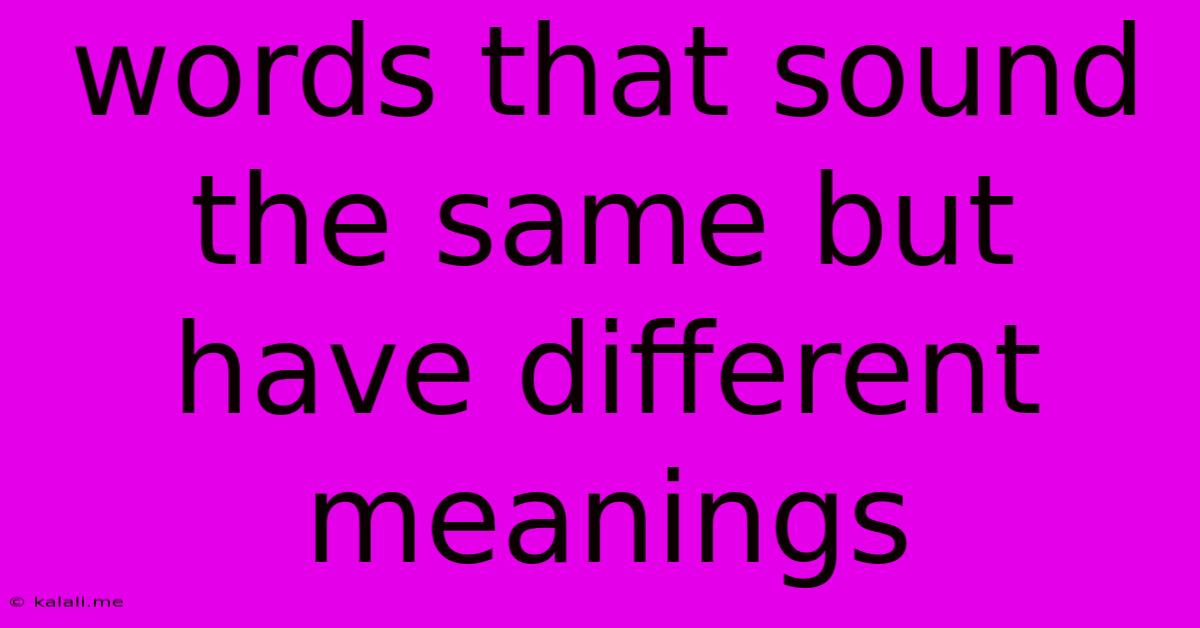Words That Sound The Same But Have Different Meanings
Kalali
May 25, 2025 · 3 min read

Table of Contents
Decoding Homophones: Words That Sound Alike, Mean Different Things
This article delves into the fascinating world of homophones – words that share the same pronunciation but possess distinct meanings and spellings. Mastering the nuances of homophones is crucial for effective communication, both written and spoken. Misunderstanding them can lead to hilarious misinterpretations or, in more serious contexts, significant communication breakdowns. We'll explore common examples, their definitions, and strategies to avoid confusion. This guide will equip you with the knowledge to confidently use these tricky words and improve your overall writing and speaking skills.
Understanding Homophones: A Closer Look
Homophones are a common source of confusion, especially for non-native English speakers. These words sound identical, but their meanings and origins are vastly different. This creates a challenge for both writers and speakers, as a simple slip-up can completely alter the intended message. Think of it like a word-based riddle – the same sound, but a different solution. The key to mastering homophones is understanding their individual meanings and contexts.
Common Examples and Their Meanings
Let's explore some frequently encountered homophones and their subtle yet critical differences:
-
There, Their, They're: This trio is notorious for causing confusion. "There" indicates a place or position. "Their" shows possession. "They're" is a contraction of "they are." For example: "They're going there because it's their house."
-
Your/You're: Similar to the previous example, "your" signifies possession, while "you're" is the contraction of "you are." Using the wrong word can drastically change the sentence's meaning.
-
Its/It's: "Its" is the possessive form of "it," while "it's" is a contraction of "it is" or "it has." For example, "The cat lost its toy." vs "It's a beautiful day."
-
To/Too/Two: "To" indicates direction or purpose. "Too" means "also" or "excessively." "Two" is the number 2. "I went to the store, but it was too crowded, and I only bought two apples."
-
Hear/Here: "Hear" refers to the sense of sound, while "here" indicates a location.
-
See/Sea: "See" is the action of viewing with your eyes, and "sea" is a large body of salt water.
-
Buy/Bye/By: "Buy" means to purchase, "bye" is a farewell, and "by" indicates proximity or means.
-
Write/Right/Rite: "Write" means to create text, "right" means correct or a direction, and "rite" is a ritual or ceremony.
Strategies to Avoid Homophone Errors
While understanding the meanings is crucial, utilizing certain strategies can enhance your accuracy:
-
Proofreading: Always take time to thoroughly proofread your work. A second pair of eyes can also help catch errors you may have missed.
-
Contextual Clues: Pay close attention to the context of the sentence. The surrounding words will often provide clues about the correct homophone to use.
-
Dictionary/Thesaurus: When unsure, consult a dictionary or thesaurus to confirm the correct spelling and meaning of the word.
-
Practice: Consistent practice is key to mastering homophones. The more you use them correctly, the less likely you are to make mistakes.
Conclusion: Mastering the Art of Homophones
Homophones are a significant component of the English language. By understanding their meanings, employing effective strategies, and practicing regularly, you can significantly improve your writing and speaking accuracy, leading to clearer and more effective communication. The journey to mastering homophones might initially seem challenging, but with consistent effort, it becomes a valuable asset in enhancing your linguistic capabilities.
Latest Posts
Latest Posts
-
Order Of Lock Washer And Flat Washer
May 25, 2025
-
Faucet Water Smells Like Rotten Eggs
May 25, 2025
-
How To Get Sand Out Of Shoes
May 25, 2025
-
Faced Vs Unfaced Insulation Crawl Space
May 25, 2025
-
Time For You To Get A Watch
May 25, 2025
Related Post
Thank you for visiting our website which covers about Words That Sound The Same But Have Different Meanings . We hope the information provided has been useful to you. Feel free to contact us if you have any questions or need further assistance. See you next time and don't miss to bookmark.